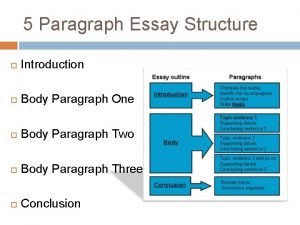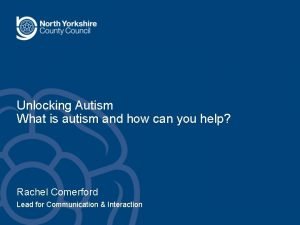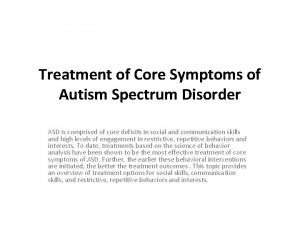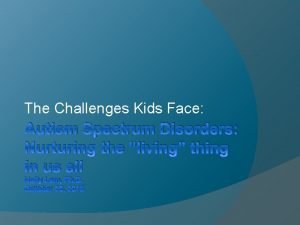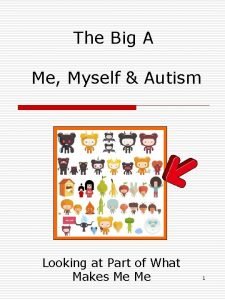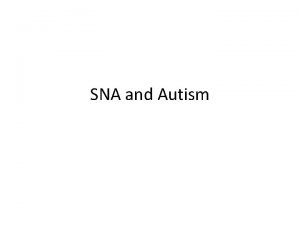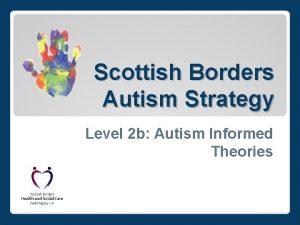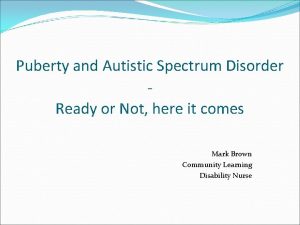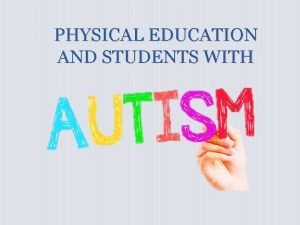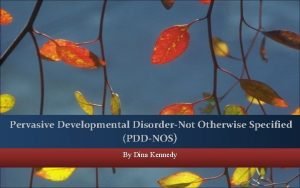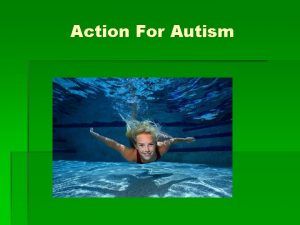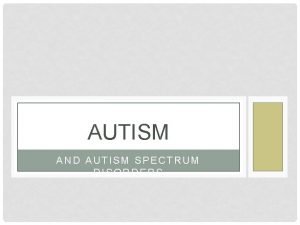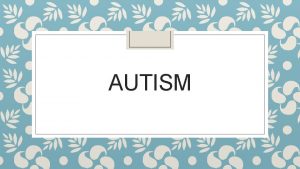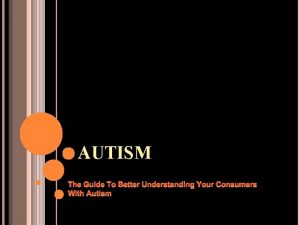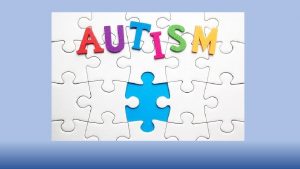Introduction What is Autism What is Autism Autism










- Slides: 10

Introduction What is Autism?

What is Autism? Autism is a lifelong neurological (brain) difference that people are born with. Simply, to be Autistic is to have your brain wired differently than most people. � Anyone can be Autistic! There is no certain group of people who can only be Autistic. In fact, most likely millions of people are Autistic. � Autism is a spectrum. No Autistic person is or will be the same. If you’ve met one Autistic person, you have met one Autistic person. �

Myself, as an Autistic Person. �I am Autistic and because of this I may behave differently than some other people. � I may seem blunt at times. � Metaphors or idioms can be difficult for me to understand, e. g. ‘He has a chip on his shoulder. ’ � From time to time imagining things may be hard. Not as in being creative but as in imagining words as a picture. A bit like with metaphors and idioms, it might make no sense to me. � A small group of people may be more enjoyable and appealing for me than a large group. Sometimes a large group of people can overwhelm me.

Sensory Processing Disorder � Sensory Processing Disorder is exactly what it sounds like. It is to do with trouble receiving and responding to information through the senses. Because of this, people with Sensory Processing Disorder can be extremely sensitive or unaffected by noises, textures, touch, lights and smell. � Not every Autistic person has Sensory Processing Disorder, but I do. � Because of this, I am sensitive to sound, lights, noises and being touched sometimes.

Dyspraxia is another word for ‘developmental coordination disorder. ’ In other words, my coordination and balance may not be that good. � Because of this I can find certain sports or exercises hard, yet this does not mean I am entirely bad at sport. � In a way Dyspraxia can also impact gross and fine motor skill which can make handwriting, sweeping etc difficult. � While Dyspraxia is also commonly linked with Autism, not every Autistic person is Dyspraxic. Remember that Autism is a spectrum. �

Stimming Sometimes, I do something called ‘stimming. ’ This stands for self-stimulatory behaviour and a lot of Autistic people do this as well. � Examples of stimming are: hand-flapping, exerting pressure, listening to music and spinning. These are just four examples of stimming. � Stimming can be to express emotions such as excitement, frustration and anxiety. Because of this, stimming can help with regulating or calming myself. When unable to stim, it can make expressing or relieving emotions harder. � Stimming is not only done by Autistic people but by everyone to some extent, e. g. twirling hair and biting nails. �

Myths About Autism � � ‘All Autistic people are maths geniuses!’ No, not all Autistic people are maths geniuses. As with everyone else on this planet we have certain topics which we fail and succeed at, but they are never the exact same topics. As an example, I am quite good at drawing and spelling yet I do not understand Irish. ‘Autistic people are bad at eye-contact’ While I do sometimes struggle with eye-contact myself, it is not true that all of us are bad with it. I’ve known and seen many other Autistic people who are quite good at making eye-contact. ‘Autistic people will always want be on their own’ Some of us can be very introverted and perform poor socially, but some of us can be the complete opposite of this. After all, don’t we all need some form of socialisation in our lives? ‘You can only be more or less Autistic!’ This myth is very far from being the truth. Autism is very complex, as people do like to put us into one box when just like everybody else we are all different. For example, some Autistic people might struggle with speech but some might not.

Terminology ‘Maria has Low Functioning Autism, while Matthew has High Functioning Autism. ’ This sentence sounds wrong for a lot of reasons. The terms I used just now are called ‘Functioning Labels’ and a lot of Autistic people dislike them. They’re very controversial, and divisive. One of the main reasons for disliking Functioning Labels is that they oversimplify Autism, which is very true and make it sound like one Autistic person has more value than the other. Overall, it’s recommended to say that the person is just Autistic and nothing else. ‘Tiffany is a person with Autism. ’ Saying person with Autism might sound good at first, but in reality it may not be very good. It makes Autism sound like something which can be removed from us, which isn’t true, and ends up making Autism sound like a disease of some sorts when it isn’t. Some Autistic people may still prefer to be called ‘a person with Autism’, but most Autistic people would prefer to be called ‘an Autistic person. ’

Strategies Every Autistic person has an individual way of coping and learning like anybody else. While that is very true, there are some things which must be allowed for the student to do. Stimming is something which I covered earlier and stimming is very important. As I said, when an Autistic person isn’t allowed to stim it can make their emotions harder to deal with and relieve. All Autistic students should have a right to stim in and out of school. It is important to tell the Autistic student that it is okay to stim, and to also encourage them. It’s a good idea to find out earlier in the year what may stress out the Autistic student you are teaching. This gives you an opportunity to learn more and for the student to cope with what may be stressing them out. You, yourself may even be stressing the student out by using a certain perfume, getting up close etc.

The End Feel free to ask questions!
